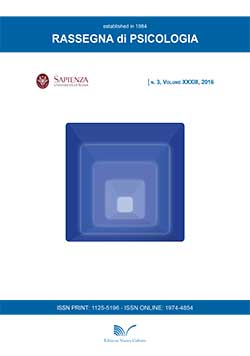Affective narratives in the management of type 1 diabetes: a pilot study of a family triad
DOI:
https://doi.org/10.13133/1974-4854/16658Keywords:
Diabetes type 1, coding system, family interactionsAbstract
The type 1 diabetes mellitus is a chronic disease caused by a metabolic disorder with multiple etiologies. Defined by Bury (2005) as a "biographical disagreement ", its treatment is based on the active involvement of families and makes it necessary to reorganize both patient daily life and his/her family one. This paper aims to analyze the interactions of a family triad in terms of enabling and constraining style and how this type of communication has an impact on the child health. We utilized for this study self-report questionnaires and Constraining and Enabling Coding System (CECS; Hauser, et al.,1991 adapted by Chiarolanza, et al., 2016) for analysis of a family triad interaction. Results showed that interactive communication in the triad are oriented towards constraining cognitive dimension. This could interfere with blood glucose monitoring and the patient relationship with integrated team care. Members of a triad can coordinate or not during a family interaction and this could have effects on adolescent health in terms of quality of family relationships and well-being.Downloads
Published
2016-12-30
Issue
Section
Articles
License
Copyright (c) 2016 Claudia Chiarolanza, Simona Lo Piccolo, Barbara Longo, Claudia Arnaldi

This work is licensed under a Creative Commons Attribution 4.0 International License.

